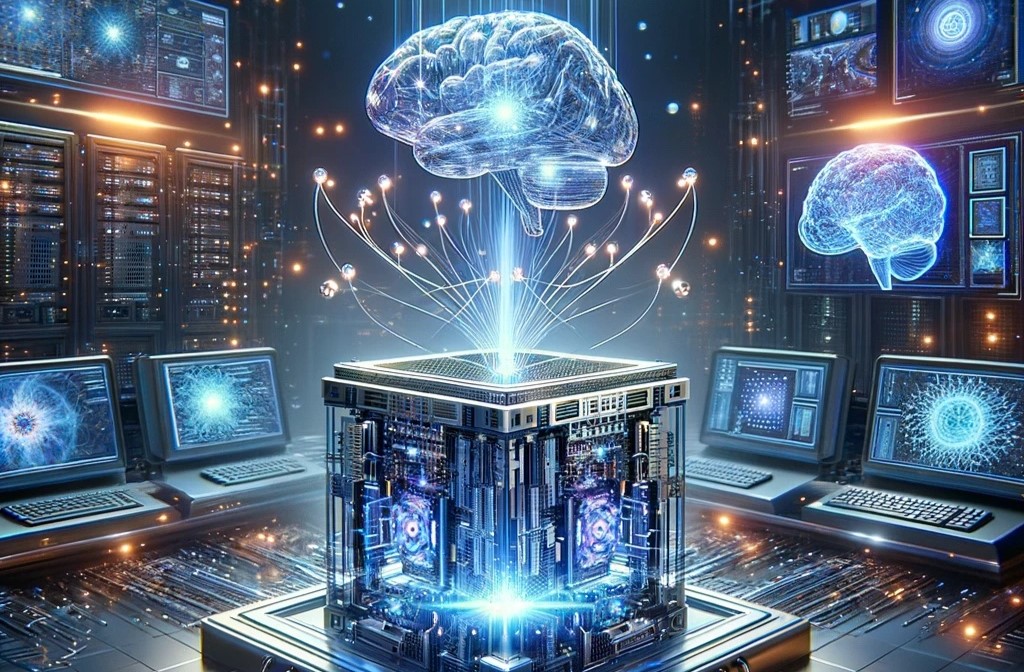In the rapidly evolving landscape of technology, two cutting-edge fields stand poised to redefine the boundaries of what’s possible: Quantum Computing and Artificial Intelligence (AI). The fusion of quantum computing’s unparalleled processing capabilities with AI’s sophisticated algorithms promises a revolution in how we tackle complex problems. This article delves into the profound implications of this synergy, exploring the potential breakthroughs, the challenges of integration, and the future it heralds for technological advancement.
Unveiling Quantum Computing: A Primer
Quantum computing transcends traditional computation by leveraging the principles of quantum mechanics. Unlike classical computers, which process bits in a binary state of 0 or 1, quantum computers use quantum bits or qubits. Qubits can exist in a state of 0, 1, or both simultaneously, thanks to superposition. Moreover, through entanglement, the state of one qubit can depend on the state of another, no matter the distance separating them. This allows quantum computers to process vast amounts of information at speeds unattainable by their classical counterparts, opening new vistas in computation.
Quantum Computing Meets AI
The integration of quantum computing with AI signifies a leap toward solving complexities that are currently beyond reach. Quantum computing can significantly speed up the processing of complex algorithms, a boon for AI’s data-intensive tasks. This synergy could lead to the development of new types of machine learning models that can learn more efficiently, make more accurate predictions, and solve intricate problems in seconds—tasks that would take classical computers millennia to complete.
Potential Breakthroughs
- Optimization: Quantum algorithms, such as the quantum approximate optimization algorithm (QAOA), could revolutionize fields that rely heavily on optimization problems, including logistics, finance, and energy distribution. Quantum computing could find the optimal solution in a fraction of the time it takes current technologies, dramatically improving efficiency and cost-effectiveness.
- Simulation: Quantum computers can simulate complex quantum systems directly, a task that is incredibly resource-intensive on classical computers. This capability could accelerate drug discovery and material science research, enabling scientists to model molecular interactions with unprecedented accuracy and speed.
- Cryptography: Quantum computing presents both an opportunity and a challenge in the field of cryptography. Quantum algorithms, like Shor’s algorithm, could break many of the cryptographic systems currently in use. This necessitates the development of quantum-resistant cryptography to secure our data in a post-quantum world.
Enabling New AI Paradigms
Quantum computing could enable AI to break through current limitations by providing the computational power needed for processing and analyzing the ever-growing datasets. Quantum-enhanced machine learning algorithms could improve learning efficiency, enable more sophisticated neural network models, and open the door to AI systems capable of complex reasoning and understanding.
The Challenges Ahead
Integrating quantum computing with AI technologies is not without its hurdles. Quantum computers are still in the nascent stages of development, with issues like qubit stability, error rates, and the need for extremely low operating temperatures. Moreover, developing quantum algorithms that can effectively leverage quantum computing’s capabilities for AI applications is a significant challenge, requiring advancements in both quantum theory and machine learning.
Another challenge lies in making quantum computing accessible to the broader AI research community. Currently, the use of quantum computers is limited to specialized research labs with the necessary expertise and resources. Bridging this gap is essential for the widespread adoption and integration of quantum computing in AI.
Looking Towards the Future
The intersection of quantum computing and AI holds the promise of ushering in a new era of technological advancement. As researchers overcome the challenges of integration, we stand on the brink of breakthroughs that could solve some of humanity’s most pressing problems, from climate change to curing diseases.
The road ahead is both exciting and uncertain, filled with potential and fraught with technical obstacles. Yet, the promise of quantum computing and AI together offers a glimpse into a future where the impossible becomes possible, heralding a new age of innovation and discovery. The synergy between these two fields could very well define the next frontier of technological evolution, transforming our world in ways we have yet to fully comprehend.

